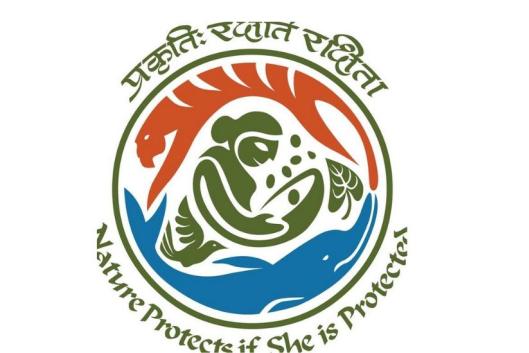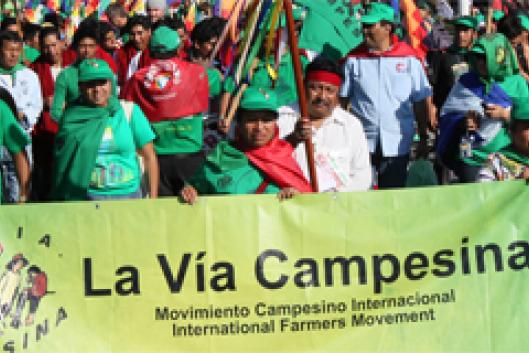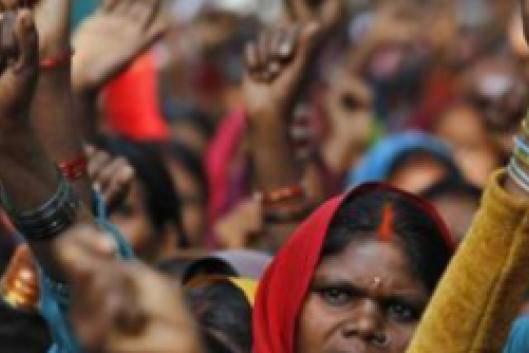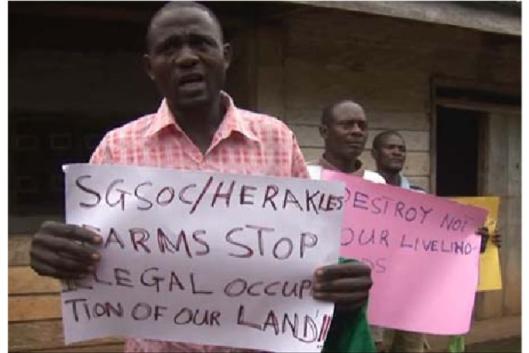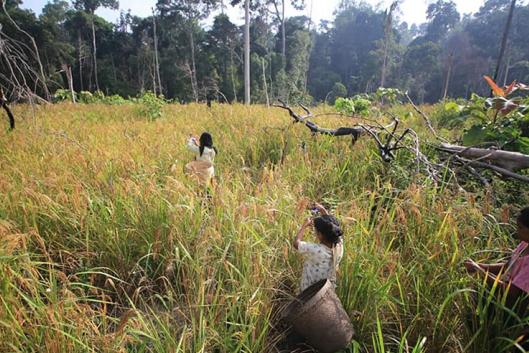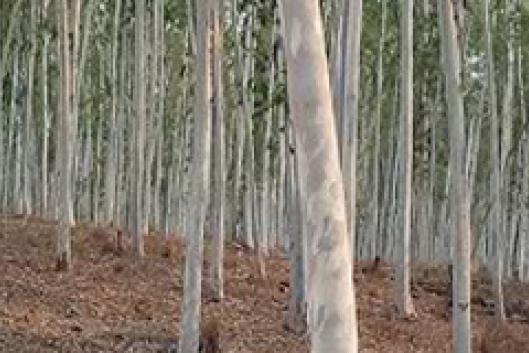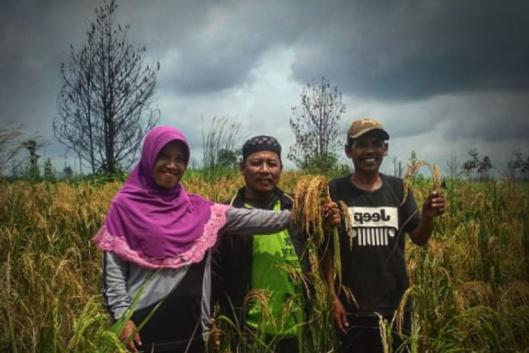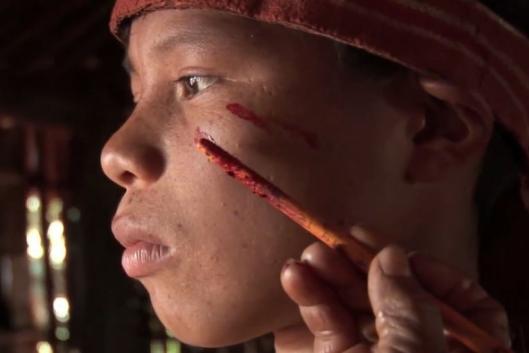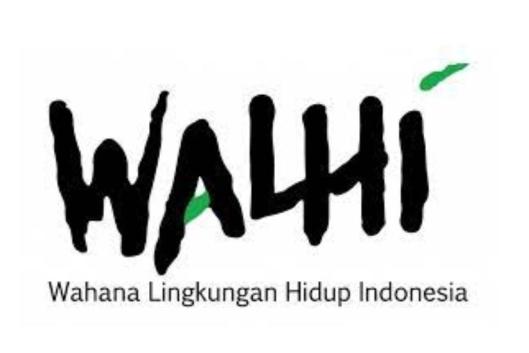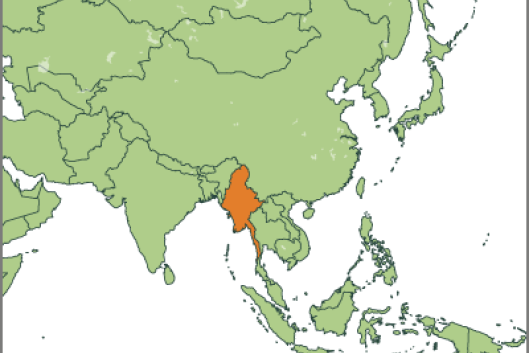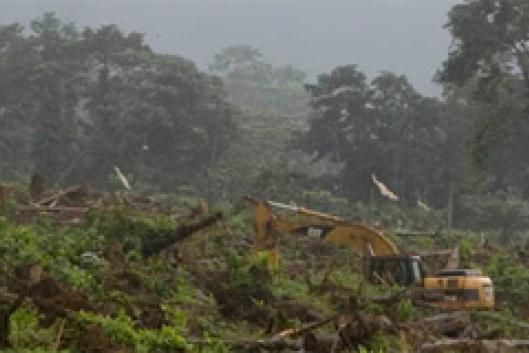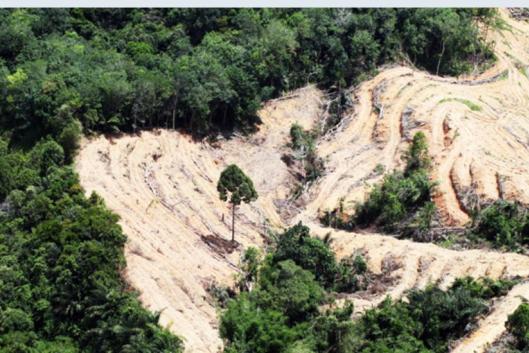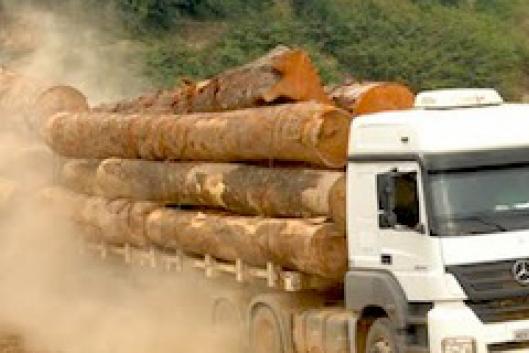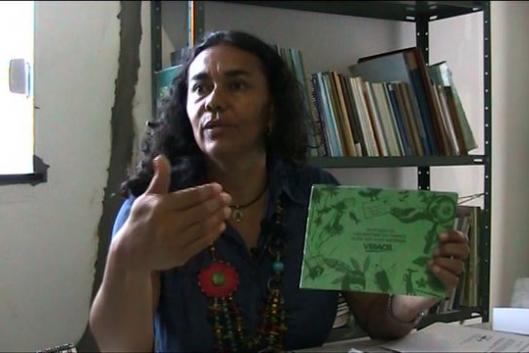This month, while another meeting of the Conference of Parties to the Convention on Biological Diversity was taking place in India, we also celebrated, on October 16, World Food Sovereignty Day.
For peasant farmers, indigenous peoples and other traditional peoples who live in and depend on forests and other biomes, biodiversity is intrinsically linked to food sovereignty and, in a broader sense, to their autonomy and freedom. For example, the diversity of traditional seeds that they use for small-scale agriculture has guaranteed these peoples, generation after generation, a significant part of their sustenance. Access to the forests and to the diversity of foods that they provide has also been crucial to their food sovereignty.
Issue 183 - October 2012
Financial markets infiltrating the CBD
WRM Bulletin
183
October 2012
OUR VIEWPOINT
FINANCIAL MARKETS INFILTRATING THE CBD
-
30 October 2012The 11th meeting of the Conference of Parties (COP 11) to the Convention on Biological Diversity (CBD) took place October 8-19 in Hyderabad, India. Among the main themes addressed was the search for means to implement the Aichi Targets and the Nagoya Protocol on Access and Benefit Sharing, which were adopted in 2010 at COP 10 to serve as the new roadmaps to guide countries in the measures to be taken to halt biodiversity loss by the year 2020, since the 2010 target had already failed to be met. (1)
-
30 October 2012La Via Campesina (LVC), the global peasants movement, have been watching the CBD discussions and in a press release asserted that “instead of protecting biodiversity, the CBD discussions are progressively degenerating to allow rapid privatization and commercialization of biodiversity. The attempt is to take biodiversity out of the hands of the farmers, fishers, indigenous people who nurture and protect it, and let it go into the hands of profiteering corporations who seek to control it for commercial ends.” The organization warned that “CBD is also discussing risky, untested and undebated technologies such as new kinds of synthetic biology, GM crops and geoengineering.”
-
30 October 2012In 2006, the Indian Parliament enacted the Scheduled Tribes and Other Traditional Forest Dwellers (Recognition of Forest Rights) Act (popularly known as Forest Rights Act). The forest law has attempted to restore and recognize the rights of forest communities over their forests, especially the community forest rights over their common resources; it has been the first time in the history of Indian forests the state formally admits that rights have been denied to forest dwelling people for long. (See WRM Bulletin 115)
COMMUNITIES AND MONOCULTURE TREE PLANTATIONS
-
30 October 2012In a context of massive land concessions in the country over the last five years - be it the expansion of existing plantations or the granting of new land concessions for palm oil or rubber - the US based company Herakles Farms, through its local subsidiary SG Sustainable Oils Cameroon PLC (SGSOC), plans to establish a large-scale industrial oil palm plantation and a palm oil refinery. Both projects would be established in an area covered by rainforest and surrounded by two national parks, a forest reserve and a wildlife sanctuary.
-
30 October 2012The struggle in Geragai District Up to 2011, a total of 18 companies had licenses over forest areas for a total of 663,809 ha distributed over 8 Regencies in Jambi Province, Sumatra, nearly 50% of which - 293,812 ha - is being controlled by one large corporation, PT. WiraKaryaSakti (PT. WKS), a subsidiary of Sinar Mas Group. The concession land of PT. WKS is divided in 5 Regencies, namely Tebo Regency, Batanghari Regency, Muaro Jambi Regency, TanjungJabung Barat Regency, and TanjungJabungTimur Regency.
-
23 October 2012This past September 21, to mark the International Day Against Monoculture Tree Plantations, the Portuguese environmental organizations Liga para a Protecção da Natureza (League for the Protection of Nature) and Quercus launched a petition against a proposed new regime for tree planting and replanting presented by the government. The petition argues that a number of the problems faced by forests in Portugal – most of which are made up of small plots of privately owned land – result from the expansion of plantations of eucalyptus trees, an exotic tree species that is the most commonly used for monoculture plantations, primarily geared to pulp production.
PEOPLES IN ACTION
-
30 October 2012About 40 farmers of a La Via Campesina member organization (Serikat Petani Indonesia) from Jambi province protested in front of the Germany Embassy on October 16 against the negative impacts of a Debt Nature Swap (DNS), signed in 2007 between the German Government and Indonesian authorities. The objective of the agreement to protect tropical forests in Sumatra led in practice to the eviction, burning of houses and arresting of farmers who have lived long in the area. Source: http://www.metrojambi.com/v1/metro/11013-puluhan-petani-merangin-demo-kedutaan-jerman.html
-
30 October 2012The Brazilian organizations Juízes para a Democracia (Judges for Democracy) and CIMI have launched a petition addressed to various Brazilian authorities to demand the urgent demarcation of indigenous lands in the country, particularly in view of the disastrous situation faced by the Guaraní-Kaiowá people in the state of Mato Grosso do Sul. The Guaraní-Kaiowá who live in the PyleitoKue/Mbarakay territory announced that they would rather die en masse than leave their territory in reponse to an eviction order and threats. They are calling on the Brazilian government and courts to revoke the eviction order and to demarcate their territories. (At http://www.avaaz.org/po/petition/Salvemos_os_indios_GuaraniKaiowa_URGENTE/?tPbAKab you can support their demands)
-
30 October 2012The state administrative High Court in Medan, has decided in favor of the organization WALHI, cancelling administrative decisions that led to the issuance of the license to the oil palm plantation PT Kalista Alam for an area of around 1,605 hectares in the Rawa Tripa peat swamp forest, Nagan Raya District, Aceh. WALHI’s National Executive Director, Abetnego Tarigan added, “The decision of PTTUN Medan is a jurisprudence for the enforcement of environmental law and environmental conservation efforts in Indonesia, which has almost never taken side with the environment and the people.” See: http://www.ejolt.org/2012/09/victory-in-lawsuit-appealon-rawa-tripa-a-jurisprudence-for- environmental-law-enforcement-in-indonesia/
-
30 October 2012The "Second Commercial Farm Asia", a fair that brings together corporate investors and governments from Myanmar and other countries in the Southeast Asia, has taken place in Yangon, Myanmar on 11-12 October. The event was to discuss how industrial agricultural and extractive investments can be expanded and facilitated.
COMMUNITIES AND FORESTS
-
30 October 2012São Tomé and Príncipe is one of the countries on the West African coast that stands out when it comes to biodiversity. For this reason, since the end of the 19th century these “beautiful equatorial islands” have attracted enormous interest from international researchers.Their forests have been classified as one of the two hundred most important areas in the world in terms of biodiversity. They are the habitat for around 25 species of endemic birds.
-
30 October 2012Barbara Zimmerman with the International Conservation Fund for Canada and Cyril Kormos, Vice President for policy with the WILD Foundation are the authors of a new study in Bioscience which argues that the ecology of tropical hardwoods makes logging with truly sustainable practices not only impractical, but completely unprofitable.
-
30 October 2012Over the last two decades, the Latin America and Caribbean region has lost 9% of its forest cover, primarily as a result of logging, the expansion of agribusiness, major infrastructure projects like highways, hydroelectric dams, mining, oil drilling and urbanization, as well as forest fires and the conversion of forests to other land uses, largely caused by these same activities.
RECOMMENDED
-
30 October 2012The IUCN has approved a Motion on Sacred Natural Sites: 'Support for Custodian Protocols and Customary Laws in the face of global threats and challenges.' The initial Declaration was drafted jointly by The Gaia Foundation (http://www.gaiafoundation.org/) with input from the African Biodiversity Network (http://www.africanbiodiversity.org/) and the Statement on Common African Customary Laws for the Protection of Sacred Natural Sites developed by Sacred Natural Sites' Custodians from Kenya, Ethiopia, South Africa and Uganda; Christopher McLeod of the Sacred Lands Film Project (http://www.sacredland.org/), Rob Wild and Bas Verschuuren of the Sacred Natural Sites Initiative
-
23 October 2012“Sustainable on Paper”, a documentary film by journalists An-Katrien Lecluyse and Leopold Broers released in Belgium in 2011, is now available on the internet. The film broadly denounces the FSC certification of plantations owned by one of the biggest eucalyptus and pulp companies in Brazil, Veracel Celulosa, a joint venture of Brazilian-based Fibria and Swedish-Finnish transnational Stora Enso.

